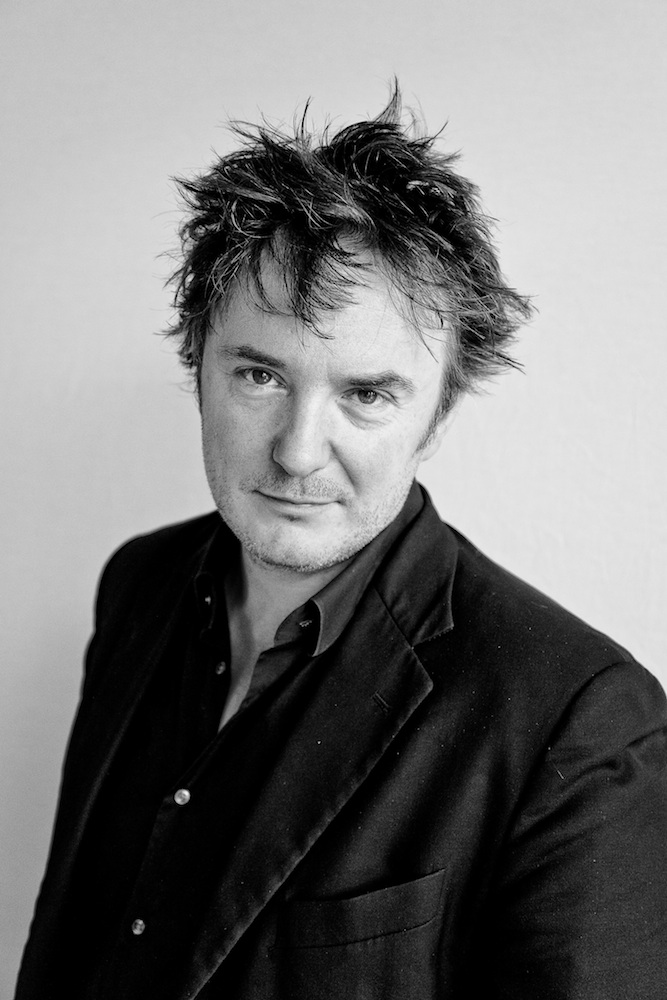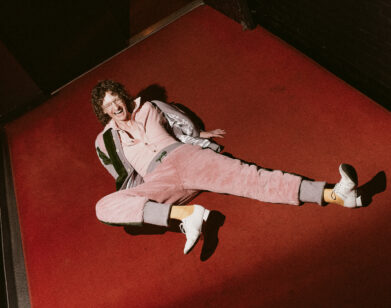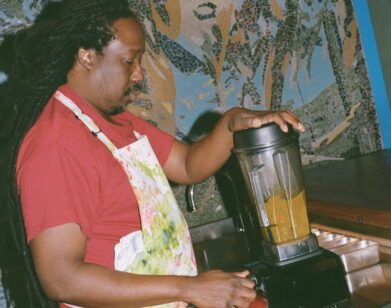Living Comedy

Dylan Moran knows how to set a scene. At the beginning of his 2010 stand-up special Aim Low: The Best of Dylan Moran, the Irish comedian addresses a crowd in Dublin. “It’s not like when I lived here, with the horizontal rain and 55 guys around one half pint in Grogan’s fighting over crisps. You know, back then, when people all styled their hair with buttermilk and there was four yellow, tawny piano pub key teeth between a family.” His imagery is vivid and offbeat, his humor sharply observed, but never mean-spirited. He’s the sort of figure who, even after achieving widespread success in the U.K., inspires cult-like, passionate fans. In the U.S., he is perhaps most famous for Black Books (2000-2004), the television series he created, wrote, and starred in for three seasons, currently available on Netflix.
For the next month, Moran is touring the U.S. with his latest stand-up show Off the Hook. While the 44-year-old has been performing the show for almost two years, he tells us “it feels very much like a living, breathing thing… I think comedians have a bit of an advantage in that there’s quite a lot of fear involved anyway,” he continues. “There’s quite a lot of nervous energy to keep you awake and in the moment.”
Tonight, he will perform at the Town Hall in New York City.
EMMA BROWN: When did you start workshopping it or performing bits of it in public?
DYLAN MORAN: Off the Hook probably began two years ago, maybe a little bit more even. A lot of material has come and gone and changed and flipped and swapped; some of which we ditched, some of which we’ve just forgotten, some was abandoned, some I probably just didn’t get to, some I’ve never done. You tend to overwrite for these things, and then you change it on the road depending on where you are and what’s going on in the world and what’s going on in your head. I’m not sure which of the original parts are still there. It’s kind of mid-flip I’d say right now.
BROWN: Does it make you feel uncomfortable, then, that there is one night when they film it, and that’s how it will be remembered?
MORAN: It’s not ideal in a way, but that’s the deal. That’s how it’s done. We did it, that was it, that was our shot, we took it. It was okay on the night; it wasn’t the best show I ever did. I did a much better show two nights before—I remember that—but the one we got is the one we got, and that’s what you live with.
BROWN: When you say there are some bits you never get to or forget or cut out, do those changes happen in the moment of the show? Are you feeling out the crowd?
MORAN: It’s partly that. Sometimes something might expand on a night, because you get somewhere with it that never occurred to you before. Some things go the other way. You thought you had something and then suddenly it dies on you. You don’t feel the life of it anymore, so you take it away.
BROWN: I’ve definitely seen comedians perform the same show multiple times, and I’m always surprised by how much of it is scripted. When you see it the first time, you think, “Oh, they just thought of that,” or, “It’s specific to this audience.” But it’s not. It’s interesting that you do actually change things depending on the night.
MORAN: I do change things, but also there’s an awful lot of skill in what you’ve just described—somebody is getting up there and it’s like doing a long take in a movie that’s believable, doing that night after night in different towns. To make the thing alive is a big part of it. It’s a very significant part of what makes it really enjoyable. It’s what makes you gasp and laugh and turn to the person you’re with. If it didn’t have that pulse of life in it, it just wouldn’t touch you.
BROWN: You’re an established figure and you have your own following. Do you ever perform in front of an audience and feel like, “This isn’t really a challenge; you’ll laugh at anything I say”?
MORAN: That is a fear, but I don’t allow that to happen to me very much because I tend to change up where I’m playing. I’ll go to a different country and try to make it work in some context that I haven’t been in before to make it new, to make it weird, to make it live for me. If I’m somewhere uncomfortable or strange, or there’s something I have to wrap myself around for it work in a place where there’s a language or cultural difference, or somewhere that’s very remote, sometimes that has helped me to make a connection with the audience. It really means you have to be present.
BROWN: Do you remember the last time you died on stage?
MORAN: I remember one time. I didn’t die exactly, but I was definitely in the emergency wing of the hospital. I don’t know what it was; it’s all about connection, really. I’d been doing lots of shows and I was actually having a good time doing shows. Then I got somewhere else and I didn’t address the context we were in. The audience felt miffed, I think. I was talking to people with folded arms because I didn’t really address the fact that we were in a very particular context. It was a charity thing. I should have said hello properly, and I didn’t.
BROWN: Is it strange doing comedy shows outside of a traditional venue? Sometimes people need to be given permission to laugh, and you get that at a comedy show in a way that you don’t at a charity event or conference.
MORAN: That’s a fair point. People do need a social license to go, “Ha ha ha,” and have a good time. It’s a strange thing. There’s a lot of social ritual around comedy and laughter. It’s a bonding experience for groups, but nobody can tell you much about how funny somebody is. Sometimes people just need to be in a group and be laughing together, just like they need to be in a group in watching some really terrifying film.
BROWN: Do you think it’s possible to be a comedian at this particular moment in time and not talk about politics?
MORAN: Sure. Anything is possible, Emma. Of course you can. Some people do it very indirectly. I think there’s a general air of anxiety amongst the generation of people who are of power-wielding age—people who are in their mid-40s or even the late-30s. Or let’s say mid-30s. I want to include everybody. Let’s say the milennials as well. People who are of voting age to people further up the scale. In my mind at least, everybody seems to have screaming heebie-jeebies about how fast everything is changing, and all the different things that are going on. We all have political awareness, and people want to make changes and to address inequality. I think it’s very hard to avoid talking about it in some sense, but you can, of course. Somebody said recently that people have started laughing at politics and listening to comedians, which is probably a dangerous corner to be on.
BROWN: I was reading your Reddit AMA, and someone asked you if there was anything you felt was off limits in your comedy. You said you weren’t interested in making fun of other people’s pain.
MORAN: There’s the old theater movement, Theater of Cruelty, where people used the spectacle of suffering as some sort of cathartic or transformative act onstage to bind the audience together into a feeling of pathos. But that’s not the same as trivial, mean comedy. I find it incredibly boring when people are mean about some individuals, especially if the individual has no power. I can understand how someone deems it necessary if somebody is in power to tear them down—I think that’s really crucial. People talking about celebrities or famous people, I don’t really give a crap about all that stuff. I’m not saying don’t make fun of celebrities, or rich, socially powerful people, but in certain cultures [there’s a] meanness about it, whether it’s people coming from elsewhere, or they’re fat or whatever it is. I make a lot of mean jokes about myself; as a theme, suffering seems to me a very interesting thing for comedy, but not the suffering of a particular individual.
BROWN: What or who makes you laugh in your personal life?
MORAN: In my personal life, my family makes me laugh more than anybody; I think that is the same everybody. I certainly hope it is. A lot of other people make me laugh. I always say S.J. Perelman. He used to write for the New Yorker, very famous. There’s lot of terrific comics around in America at the moment. I just watched Ali Wong the other night. She was terrifically funny. There’s a cartoonist—he’s Canadian—called Marc Bell. I think he’s incredibly funny. There’s a wonderful Dutch comedian called Hans Teeuwen. There are lots of very funny women around—Lena Dunham has made me laugh; Amy Schumer has made me laugh a lot.
DYLAN MORAN WILL PERFORM OFF THE HOOK TONIGHT AT THE TOWN HALL IN NEW YORK CITY. FOR THE REST OF MORAN’S U.S. TOUR DATES, VISIT HIS WEBSITE.






